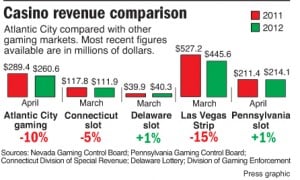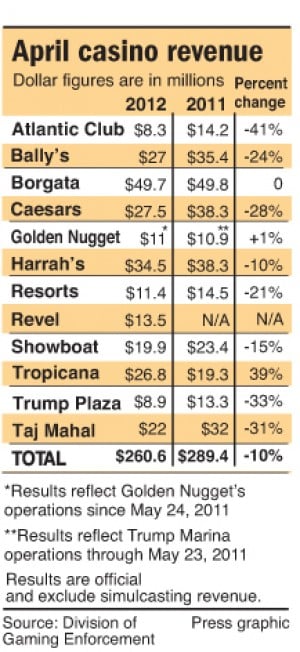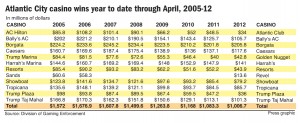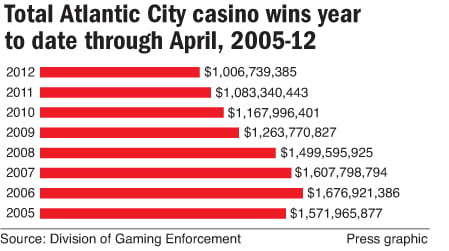http://www.pressofatlanticcity.com/news/breaking/despite-revel-s-opening-atlantic-city-casino-revenue-falls-percent/article_07643f70-9aad-11e1-88b0-0019bb2963f4.html
By DONALD WITTKOWSKI Staff Writer |
ATLANTIC CITY — Revel’s new, $2.4 billion megaresort was not enough to propel Atlantic City’s casino industry toward higher revenue in April.
Overall, the 12 casinos posted $260.6 million in winnings from slot machines and table games, a 10 percent decline from the $289.4 million earned in April a year ago, the New Jersey Division of Gaming Enforcement reported Thursday. Slot revenue fell 9 percent to $189.5 million, while table games were down 12 percent at $71.1 million.
Revel, which opened April 2, generated just $13.4 million in gambling revenue during its first month of operation, placing it eighth in the industry. Revel CEO Kevin DeSanctis explained that a limited number of hotel rooms and technology glitches hampered business during the start-up phase.
“Generally, it has been very, very positive,” DeSanctis said of Revel’s debut. “I would expect May will improve a little bit. I expect revenue will really pick up in June, July and August.”
Revel has characterized its first eight weeks of operation as a preview period leading up to a formal grand-opening celebration over the Memorial Day weekend headlined by pop superstar Beyonce.
Atlantic City officials have been pointing to Revel as a catalyst for growth. Revel, the first new casino to open here in nine years, may eventually challenge Borgata Hotel Casino & Spa as the top-grossing casino, analysts predict. However, April’s surprisingly low revenue shows it will take time before Revel fully ramps up.
“Although it is too early to judge the success of Revel based on one month’s revenues following a soft opening, gaming revenue of $13.4 million is underwhelming,” Andrew Zarnett, an analyst for Deutsche Bank, wrote in an investor note. “Although not entirely comparable, the Borgata in its first full month of operation generated gaming revenues of approximately $47 million in July 2003. As we head into the busy summer months, gaming revenues for Revel will need to dramatically improve … and we believe they will.”
The Atlantic City market continues to struggle with the fragile economy and against casino competition in surrounding states. In a year-over-year comparison, revenue has declined in every month — except December 2011 — since September 2008.
“It would be hard to say it wasn’t disappointing,” Tony Rodio, president and CEO of Tropicana Casino and Resort, said of the market’s overall performance in April. “We had a new entrant in the market. I certainly would have expected better results than what we saw. It’s certainly disappointing.”
Tropicana was the lone standout during April, scoring a 10 percent increase at the slot machines and nearly tripling its table-games revenue compared to April 2011. Rodio said Tropicana benefited from a few high rollers losing big at the tables, although he noted that Atlantic City blackjack whiz Don Johnson was not one of them. Johnson raked in $5.8 million in winnings from Tropicana’s blackjack tables in April 2011, which made this April an easy comparison for Tropicana.
“The table games are going to swing wildly from month to month. My focus is on the slots side,” Rodio said.
Overall, Tropicana’s revenue soared 39 percent in April. Tropicana was the only casino to post a double-digit increase in slots revenue for the month. Rodio attributed the jump in gambling revenue to a spin-off effect from The Quarter, Tropicana’s retail, dining and nightclub complex.
“We’ve just re-energized the place,” he said. “We’ve created a fun atmosphere by leveraging The Quarter. There is so much energy, so much activity and so many different elements to it. It is starting to pay dividends.”
Golden Nugget Atlantic City, which has begun to capitalize on its newly completed $150 million renovation project, was up nearly 8 percent at the slot machines in April, but a 22 percent decline in its table-games win kept its revenue essentially flat overall.
Atlantic Club Casino Hotel was the worst performer for the month, suffering a 41 percent overall decline in revenue, including a 63 percent plunge at the table games. Trump Plaza Hotel and Casino and sister property Trump Taj Mahal Casino Resort both were down more than 30 percent overall.
Michael Frawley, the Atlantic Club’s chief operating officer, blamed construction disruptions on the casino floor for driving down business in April. But with upgrades to the casino floor now completed, Atlantic Club is preparing to launch new promotional slot giveaways to draw customers back.
“We’re just about ready now and we’ll be coming out with an aggressive marketing campaign. Now that we’re finished, we have something special to offer our customers,” Frawley said.
Frawley, though, warned about the sluggish economy and competition from casinos in surrounding states continuing to be a drag on business. He pointed to Atlantic City’s April results as reasons for caution.
“It’s absolutely part of the weak economy,” he said. “We have regional gaming hanging over our heads all the time. It’s beyond difficult at this point.”








